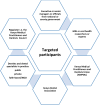" Dentists are never seen": perspectives on multiple job holding among dentists in Nairobi, Kenya
- PMID: 40708785
- PMCID: PMC12286992
- DOI: 10.3389/frhs.2025.1595302
" Dentists are never seen": perspectives on multiple job holding among dentists in Nairobi, Kenya
Abstract
Introduction: Multiple job holding (MJH), the phenomenon of working in more than one paid job simultaneously, affects the achievement of universal health coverage. The dearth of research on MJH among dentists, especially in Africa, forms the backdrop to this study. This study aimed to explore the perspectives of key policy actors on MJH among dentists in Nairobi, Kenya.
Methods: This qualitative study combined semi-structured interviews with key informants and in-depth interviews with dentists who are engaged in MJH. The key informants were selected purposively from the Kenyan government, the regulator, representative organizations of dentists, and oral health researchers and/or experts in human resources for health. The dentists were selected from the government, the private sector, and faith-based organizations, using snowball sampling. The interviews focused on knowledge and/or experiences of MJH, reasons for, and the consequences of MJH. The interviews were analyzed using thematic analysis.
Results: Thirty interviews were conducted, comprising 20 key informants, and 10 dentists. MJH among dentists is seen as a normative practice, facilitated by a profession characterized by high rewards and few or no adverse consequences from absenteeism. Although additional income is the primary motivation for MJH, low job satisfaction, the lack of continuing professional development, perverse incentives, and a dysfunctional and resource-constrained public health sector exacerbate MJH. The lack of regulation compounds the practice, while a strong private health sector provides opportunities for multiple sources of income, affecting the provision of oral health services negatively in the public sector.
Conclusion: MJH among dentists in Nairobi, Kenya is common because of high rewards and few or no adverse consequences from absenteeism. The high reported occurrence of MJH requires a multi-pronged approach that combines individual, system, and structural interventions. Such an approach should also consider the drivers of MJH, and ensure collaboration among policymakers, dentists, and health service managers to develop strategies to mitigate the potential negative consequences of MJH for patients, the health workforce, and oral healthcare delivery in Nairobi.
Keywords: Kenya; dentist; health workforce; multiple job holding; oral health.
© 2025 Ogada and Rispel.
Conflict of interest statement
The authors declare that the research was conducted in the absence of any commercial or financial relationships that could be construed as a potential conflict of interest. The author (LR) declared that they were an editorial board member of Frontiers, at the time of submission. This had no impact on the peer review process and the final decision.
Figures
Similar articles
-
Accreditation through the eyes of nurse managers: an infinite staircase or a phenomenon that evaporates like water.J Health Organ Manag. 2025 Jun 30. doi: 10.1108/JHOM-01-2025-0029. Online ahead of print. J Health Organ Manag. 2025. PMID: 40574247
-
Sexual Harassment and Prevention Training.2024 Mar 29. In: StatPearls [Internet]. Treasure Island (FL): StatPearls Publishing; 2025 Jan–. 2024 Mar 29. In: StatPearls [Internet]. Treasure Island (FL): StatPearls Publishing; 2025 Jan–. PMID: 36508513 Free Books & Documents.
-
Health professionals' experience of teamwork education in acute hospital settings: a systematic review of qualitative literature.JBI Database System Rev Implement Rep. 2016 Apr;14(4):96-137. doi: 10.11124/JBISRIR-2016-1843. JBI Database System Rev Implement Rep. 2016. PMID: 27532314
-
Public stewardship of private for-profit healthcare providers in low- and middle-income countries.Cochrane Database Syst Rev. 2016 Aug 11;2016(8):CD009855. doi: 10.1002/14651858.CD009855.pub2. Cochrane Database Syst Rev. 2016. PMID: 27510030 Free PMC article.
-
Factors that influence the provision of intrapartum and postnatal care by skilled birth attendants in low- and middle-income countries: a qualitative evidence synthesis.Cochrane Database Syst Rev. 2017 Nov 17;11(11):CD011558. doi: 10.1002/14651858.CD011558.pub2. Cochrane Database Syst Rev. 2017. PMID: 29148566 Free PMC article.
References
-
- World Health Organization. Global Strategy on Human Resources for Health: Workforce 2030. Geneva: World Health Organization; (2016).
-
- George AS, Campbell J, Ghaffar A, Abimbola S, AbuAlRub R, Bhatnagar A, et al. Advancing the science behind human resources for health: highlights from the health policy and systems research reader on human resources for health. Health Res Policy Syst. (2018) 16(1):80. 10.1186/s12961-018-0346-5 - DOI - PMC - PubMed
-
- United Nations. Transforming Our World: The 2030 Agenda for Sustainable Development. New York: United Nations; (2015).
LinkOut - more resources
Full Text Sources


